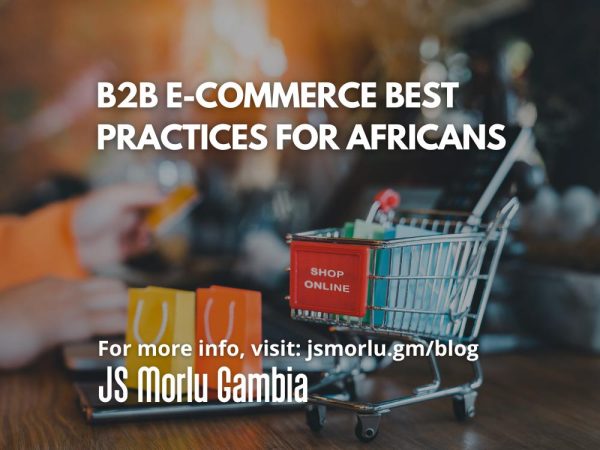Business-to-business (B2B) e-commerce refers to the marketing and selling of goods through electronic transactions between companies. It’s the process where entrepreneurs buy raw materials, physical goods, and remote services with credit card or wire transfer payment methods.
B2B e-commerce allows African manufacturers, wholesalers, or retailers to perform business transactions using a remote sales portal. But many entrepreneurs don’t know the best practices to increase conversions while engaging with customers.
This article focuses on the B2B e-commerce best practices for Africans. We gathered this information from reliable sources such as Forbes, Marketpath, Ultracommerce, Hubspot, Indeed, etc.
What are the B2B E-commerce Best Practices for Africans?
Building a practical search function, implementing security measures, and making your checkout process easy are the B2B e-commerce best practices. Offering multiple payment options and making reordering seamless are also ideal strategies. Let’s dig into the details:
1. Implement Security Measures
Forbes revealed that security is paramount for B2B Ecommerce companies, making it one of the first practices for African business owners.
Since ransomware can leave B2B e-commerce businesses without the data to operate efficiently, organisations should implement security measures to protect customers.
Beyond these measures, E-commerce business owners in Africa should implement security measures to reduce data breaches on their websites. Companies with a broad range of customers should tackle any security issue with a comprehensive response strategy.
African business owners should consider hiring a compliant payment service provider providing advanced encryption to protect sensitive information. Ensure the selected service offers fraud protection protocols for improved protection.
2. Implement a Search Function
Marketpath says a search function on your e-commerce website improves user experience and gives your business a competitive advantage. The feature allows customers to navigate and explore your page, which often translates into higher sales.
E-commerce business owners in Africa should consider integrating a practical search function to help customers find desired products quickly. It also helps them narrow search results and sort by price, availability, and specific categories.
Ensuring the search feature reflects available products on your site and keeping it up-to-date are excellent B2B e-commerce best practices. It’s crucial to make your applications and website mobile-friendly.
3. Make the Reordering Process Seamless
Data on Ultra Commerce reveal that a seamless reordering process is essential for generating sales for your B2B e-commerce website. Africans can benefit by making customer order history and data the foundational element of the system.
A quick, seamless reordering process helps customers save energy and time, translating into higher customer satisfaction. Buyers don’t mind purchasing goods and services from the same supplier if they enjoy the experience.
African business owners can allow customers to save shipping information, payments, and orders. It eliminates the need for users to re-enter information whenever they purchase an item.
4. Ensure the Checkout Process is Frictionless
E-commerce business owners in Africa can increase marketing ROI by reducing customers’ time and effort when checking out after buying an item on their website. Information on Hubspot shows that having a fast and frictionless checkout process can help companies retain and convert buyers.
Africans should consider introducing auto-fill features, removing unnecessary steps, and wasting customers’ time. It’s handy for navigating pages, filing multiple forms, and encouraging repeat business for increased conversions.
Business owners in the e-commerce industry on the African continent should consider offering multiple payment methods and shipping alternatives with flexible terms. It can also make the checkout process frictionless.
5. Provide Quality Customer Service
According to Indeed, the quickest way to increase the company’s profitability is by providing quality customer service as a B2B e-commerce business. It’s how the organisation interacts with clients and one of the best practices that increase buyers’ satisfaction.
Entrepreneurs should keep quality customer service at the top of their minds and hire well-trained employees. It boosts employee retention and builds trust and brand loyalty.
African business owners should go the extra mile to address customers’ concerns and provide helpful solutions exceeding their expectations. Consider hiring knowledgeable professionals for your team to achieve desired results.
6. Adopt Automation
Bigcommerce describes automation as the software that allows you to focus on essential business matters. It saves companies resources and time while streamlining workflow processes and increasing the effectiveness of sales and marketing activities.
African Ecommerce business owners can automate marketing strategies to reach potential customers and build efficiently. They can use automation tools like Hubspot for eCommerce, Mailchimp, and Google Smart Shopping for customer acquisition, order fulfilment, and payment processing.
Africans can identify customer preferences and personalise their experience with computerisation. Conduct extensive research on automation tools and choose the most suitable for your business.
7. Offer Multiple Payment Options
GoCardless revealed that offering multiple payment methods minimises abandoned carts and maximises conversion rates. It also appeals to your business to a broader demographic and enhances brand perception.
African e-commerce entrepreneurs can receive payment from different countries and attract new customers by offering multiple payment options. Allowing users to pay with their preferred method builds trust and improves their experience.
With this strategy, African businesses can make checkouts easy for customers and expand into new markets, whether in Nigeria, Ghana, Egypt, Senegal, Cameroon, Kenya, or Morocco.
African e-commerce entrepreneurs should also measure their operational success using Key Performance Indicators (KPIs). It’ll help you identify areas for improvement and track the company’s progress.
Original Source: Business Insider Africa
